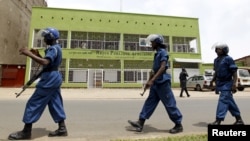Hundreds of people in Burundi's capital fled their homes Friday, one day ahead of a government deadline to turn in their firearms.
"We are fleeing because we’ve heard about the president's directive and I'm scared they are going to call us fighters," said one resident of Bujumbura, who asked not to be identified.
President Pierre Nkurunziza said Monday that Burundians had until November 7 to voluntarily give up their guns or risk being "dealt with as enemies of the nation." The decree followed a failed coup attempt in May and months of violent street protests over the president's controversial bid for a third term. More than 200,000 people have fled the Central African country.
On the eve of the deadline, hundreds of people in the capital's Mutakura neighborhood left their homes, on foot or on bicycles, with whatever belongings they could carry.
In an interview Friday with VOA, Thomas Perriello, the U.S. special envoy for the Great Lakes Region, said, "There are very few people in Burundi and probably in the government who wouldn’t want to turn the clocks back one year to when Burundi was a success story, with talks on how to build on economic growth and see the first democratic transition under the constitution.
"But instead we have a country on a brink of civil war, under economic sanctions, and facing tremendous humanitarian and security difficulties.”
The U.N. human rights chief has estimated that at least 198 people have been killed in Burundi since late April, when Nkurunziza announced his bid for re-election.
It appears Nkurunziza's supporters and opponents are killing each other, and the security forces are killing opposition members. A former intelligence chief who was a staunch ally of Nkurunziza was among the victims, but many of those killed have been ordinary Burundians whose bodies were dumped far from where they lived.
Perriello said there was still a chance to restart peace talks between the rival factions in Burundi and regain the momentum the country has had since the end of its civil war in 2005.
“We maintained open lines of communications with the government of Burundi, those in civil society and the opposition," he said. "We want to be partners with the people of Burundi, but that can only happen under the circumstances that have the country on a path to an inclusive peace.”
He said he’s eager for Burundi's neighbors to play a constructive role, whether they have alliances with Nkurunziza or the opposition.
In a statement Friday, U.N. Secretary-General Ban Ki-moon expressed grave concern that in recent weeks, the discovery of the bodies of civilian victims, many apparently summarily executed, had become a regular occurrence in parts of Bujumbura.
Ban called on all Burundians, especially government leaders, “to help create the conditions for a credible and inclusive dialogue that can address the deep political challenges the country currently faces.”
Some information for this report came from AP.












